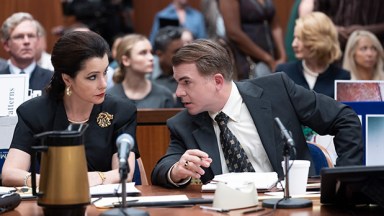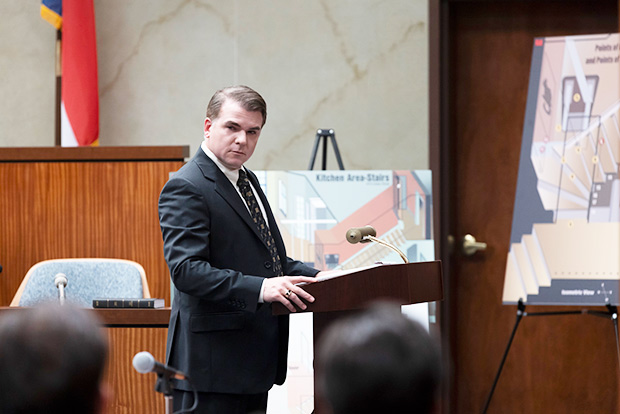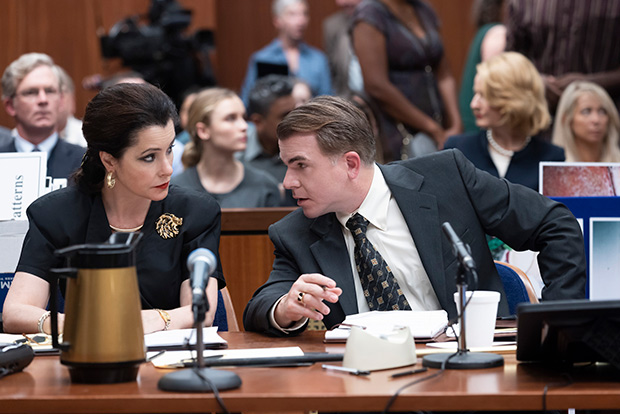
The Staircase was a gripping and poignant exploration of the death of Kathleen Peterson and the impact the case had on the Peterson family. Outer Banks alum Cullen Moss played Jim Hardin, the prosecutor in the Michael Peterson murder trial. Jim and his partner, Freda Black, went to great lengths to get justice for Kathleen.
Cullen, a North Carolina native himself, spoke EXCLUSIVELY with HollywoodLife about a subtle but powerful moment in the Emmy-nominated series that gave insight into Jim Hardin. He also discussed Parker Posey’s transformation into Freda Black and why he wasn’t surprised by Michael Peterson putting the series on blast. Read our Q&A below:

I’m in North Carolina native, so I was well aware of the Michael Peterson saga before the show. I know that you are an NC native as well. How aware were you before you took on the role of Jim?
Cullen Moss: I was fairly aware. I remember when all that was going down I was in my early 20s living in Wilmington, North Carolina, having come from Winston Salem. So it wasn’t as immediate as when I was in Winston, but I definitely remember it all over the news. The owl, the house stuff stood out, but I did not watch the documentary until I got the opportunity to read for this role. So then I binged the documentary, lots of Court TV, and interviews. This show certainly put it in the spotlight.
There’s a scene in episode 3 when Jim is talking to Freda in his office, and it’s a rare moment of vulnerability for him where he talks about losing his brother and sisters in a house fire. Especially with courtroom dramas, we don’t usually see a lot of backstory into the lawyers. How did it feel to shed some light on Jim and his motivation to get where he is?
Cullen Moss: I loved that opportunity because when you’re playing these real people, you don’t want them to be two-dimensional. You want all the nuance to be there. I had gotten the opportunity to speak with Jim at great length. Parker and I both spoke with him for almost two hours on a Zoom call. Parker set that up. She was so great because she didn’t have Freda to call upon, so we relied on insight from Jim and insight from a wonderful woman named Candy who worked in the DA’s office and was friends with Freda. When I got to speak with Jim, I did get to see this very human side of him and hear about the very real and honest beginnings of what fueled him to become a lawyer. There was no faux righteousness about it. It was from a very real place of wanting to figure out how to serve his community. From the get-go, that was all about justice for Kathleen, for this woman who he felt was really killed.
That opportunity was great. It was also an opportunity for Parker and me to kind of humanize our relationship. That was a little bit of improv there at the beginning where Jim asks about her girls. She’s like, “I want to bring up something about the kids are with Van,” She wanted to show that she’s a mother with an ex-husband that she’s got to deal with, she’s tired, she’s got kids that she loves. That was another thing. It helped soften Freda, who we learned was actually a really maternal woman outside of the courtroom and would bring banana bread for people. So Parker and I kind of came up with that [moment], and it’s one of my favorite moments where she said, “Yeah, I told her she had to stop eating so much macaroni or her hair would get curly.” I said, “I’ve never heard that before.” She just had this moment that it didn’t hit me until I watched it that she said “mmhm.” I was thinking, she’s exhausted. She’s already probably had an airplane bottle or two, and I didn’t even think about it on the day. She was so subtle about that stuff. I was a little trepidatious about that scene, too. Because we weren’t able to use the siblings’ real names, so I almost didn’t want to say the names just because that was the one time that I felt like I was not honoring Jim. It was like I was stepping out a little bit, and I don’t know if that was a battle worth I should have fought or not. But that’s one thing that sticks out weird to me, but I’m so glad it was there. But the scene was very humanizing, and I think it made Jim less of a heavy.

With the show and the documentary, people have thoughts on what really happened. The only two people that know what really happened are Kathleen and Michael. Did you always view what happened to Kathleen from Jim’s point of view? Did you ever allow yourself to explore alternate theories?
Cullen Moss: When I first saw the documentary, when that was my only source of information aside from what I gleaned in real-time when it was happening, I was left really not knowing. I didn’t know. But then as I watched more TV and just in read up more about it, maybe I was pushed that way because of the perspective that I had to take on as Jim. I became more and more certain in myself of the opinion that he was guilty, that he did it. But being a part of the show does shed light on the possibilities. When they portray each situation, it’s all so plausible. You have to resign yourself to the fact that no one will ever know. There’s no absolutism here.
You work mainly alongside Parker. Her transformation into Freda Black is astounding. When you saw her in character for the first time, how did you react?
Cullen Moss: She was so perfect. I get emotional because I miss her. When I first found out she was going to be playing Freda was when we had our first table read on the Zoom call. I only knew that Colin [Firth] and Toni [Collette] were involved. I think maybe I just found out Michael Stuhlbarg was involved. Stuhlbarg’s amazing and I’m working with him now on Your Honor in New Orleans. That’s amazing. We were both in season 1 of The Staircase but never had any interactions. Our characters will cross paths this season.
So I see her square pop up on the Zoom call and I freaked out. I fanboyed. She’s the sh*t. I was like, who could she be playing? It’s got to be Freda. And then she introduced herself and I was such a geek. I fist-pumped. I was clapping on Zoom. Fortunately, she laughed and was gracious about it and reciprocated. When I saw her in full makeup, it was overwhelming. It was moving. The makeup and the attitude, it was really special, man. There were so many moments of things becoming surreal on that show and just feeling like, where the hell am I? Because I was so familiar with the story at this point. In the courtroom, especially when you look around, you’re fully immersed. Everybody on the defense side, too, was just in the moment. When you saw the Peterson family: Dane [Dehaan], Patrick [Schwarzenegger], Odessa [Young], and Sophie [Turner]… They were just so amazing and bright, and then just the various people who took the stand, you’re whisked into that world immediately, especially Susan Pourfar, who played Deborah Radisch.

Michael Peterson obviously spoke out about the show after. Were you surprised by his reaction?
Cullen Moss: No. I think he likes to hear himself. I think he welcomed the opportunity to have a platform and have an opinion that was widely heard. I wasn’t that surprised. I was a little surprised at how disingenuous some of it was, as far as saying that he didn’t know that this was going on. I mean, he did. He has every right to feel however he felt about it, but it’s a story. It’s gonna get told. And just the fact that he was saying I don’t care about myself. It’s my family. And Jean-Xavier for selling him out and everything. He had already sold out when he did the doc. So I was not surprised and I wasn’t surprised at the self-righteous indignation of it all. It’s Michael Peterson and Michael Peterson is gonna Michael Peterson.


